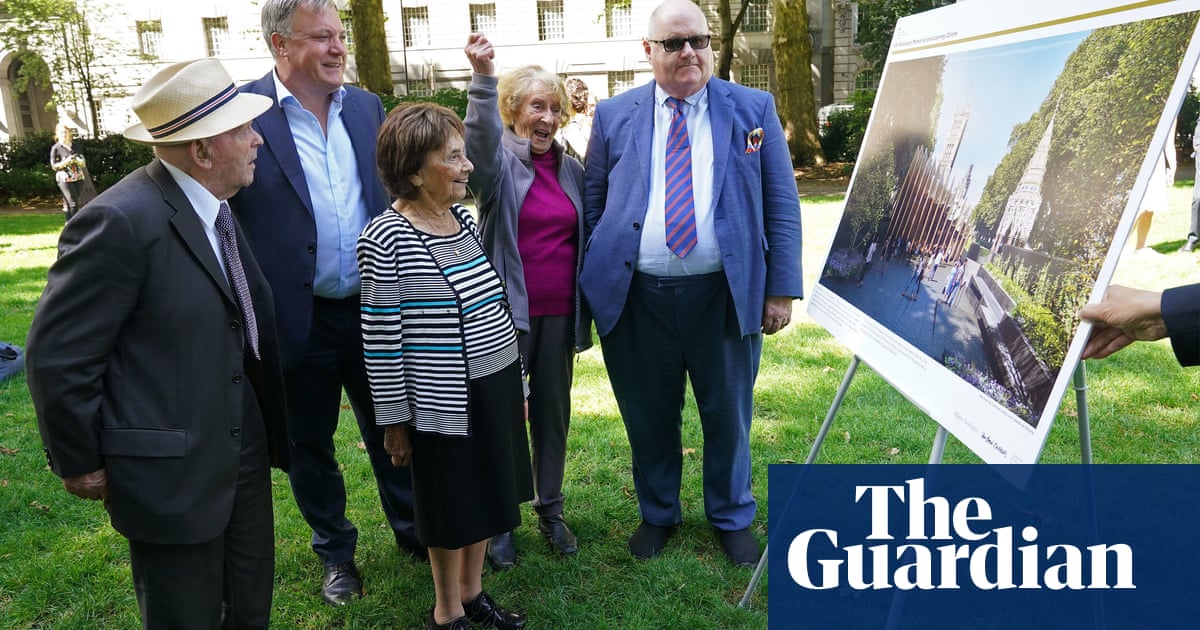
The high court has overturned a government decision to build a national memorial to the Holocaust next to parliament, after an appeal by campaigners who argued the project was the “right idea, wrong place”.
Planning permission for the memorial and education centre was granted last year after a six-week public inquiry. The government had called in the decision from Westminster city council amid controversy over the scheme.
Earlier this year, the London Historic Parks and Gardens Trust brought a case against the government’s decision. Opponents of the scheme included the former archbishop of Canterbury Rowan Williams, local community groups and some Jewish leaders and Holocaust survivors.
The memorial plan was initiated by David Cameron in 2015 and backed by the Board of Deputies of British Jews. A team led by Sir David Adjaye was chosen to design the project after a competition that attracted some of the world’s leading architecture consortiums.
It was due to be built in Victoria Tower Gardens, a small Grade II-listed green space next to Westminster Abbey and the Palace of Westminster, and was expected to cost more than £100m.
In a ruling on Friday, Mrs Justice Thornton highlighted that all those involved in the court case “support the principle of a compelling memorial to the victims of the Holocaust and all those persecuted by the Nazis during those years when ‘humanity was tipped into the abyss of evil and depravity’.”
The issue dividing the parties, she said, was “the proposed location of the memorial in Victoria Tower Gardens”.
At a hearing in February, the trust, whose challenge was opposed by ministers, claimed the development would have an impact on the heritage setting, including the Buxton memorial celebrating the abolition of slavery.
The trust’s lawyer, Richard Drabble QC, also said plans did not comply with a 1900 law affecting park land, the requirements of which represented “a prohibition on using Victoria Tower Gardens as anything other than a garden open to the public”.
In Friday’s ruling, Thornton said the trust’s case against the planning permission had succeeded in relation to its arguments over the 1900 law.
The act “imposes an enduring obligation” to retain land “as a public garden and integral part of the existing Victoria Tower Gardens”, she said.
Helen Monger, the director of the London Historic Parks and Gardens Trust, said: “This is major boost for the protection of London parks at a time when they’ve never been more valued by the public. The high court has given the government a welcome chance to reflect and re-consider the best site for a fitting Holocaust memorial, which the UK deserves.”
Barbara Weiss of the campaign group Save Victoria Tower Gardens said: “We have argued for many years that the government is pursuing the right idea in the wrong place. Today’s judgment sends a strong message about the protection of public parks.”
A spokesperson for the Department for Levelling Up, Housing and Communities said it would consider the next steps, adding: “The government remains committed to the creation of a new national memorial commemorating the victims of the Holocaust and it is disappointing – especially for Holocaust survivors – that this judgment will delay its completion.”
Ephraim Mirvis, the UK’s chief rabbi, said the decision was “an unfortunate setback”. He added: “With hateful rhetoric on the rise across the world our sacred responsibility to live up to that commitment is more urgent and vital than ever.”
The Holocaust Memorial Day Trust said the ruling was regrettable. Olivia Marks-Woldman, its chief executive, said: “We believe the need to establish a permanent physical Holocaust memorial for generations to come is particularly acute given continuing prejudice and situations around the world where people face atrocities and war crimes.”
Some opponents of the scheme argued it may detract from a new Holocaust gallery at the Imperial War Museum in London, and the National Holocaust Centre and Museum in Nottinghamshire.
Construction of the memorial had been expected to begin this year and be completed by 2025.












